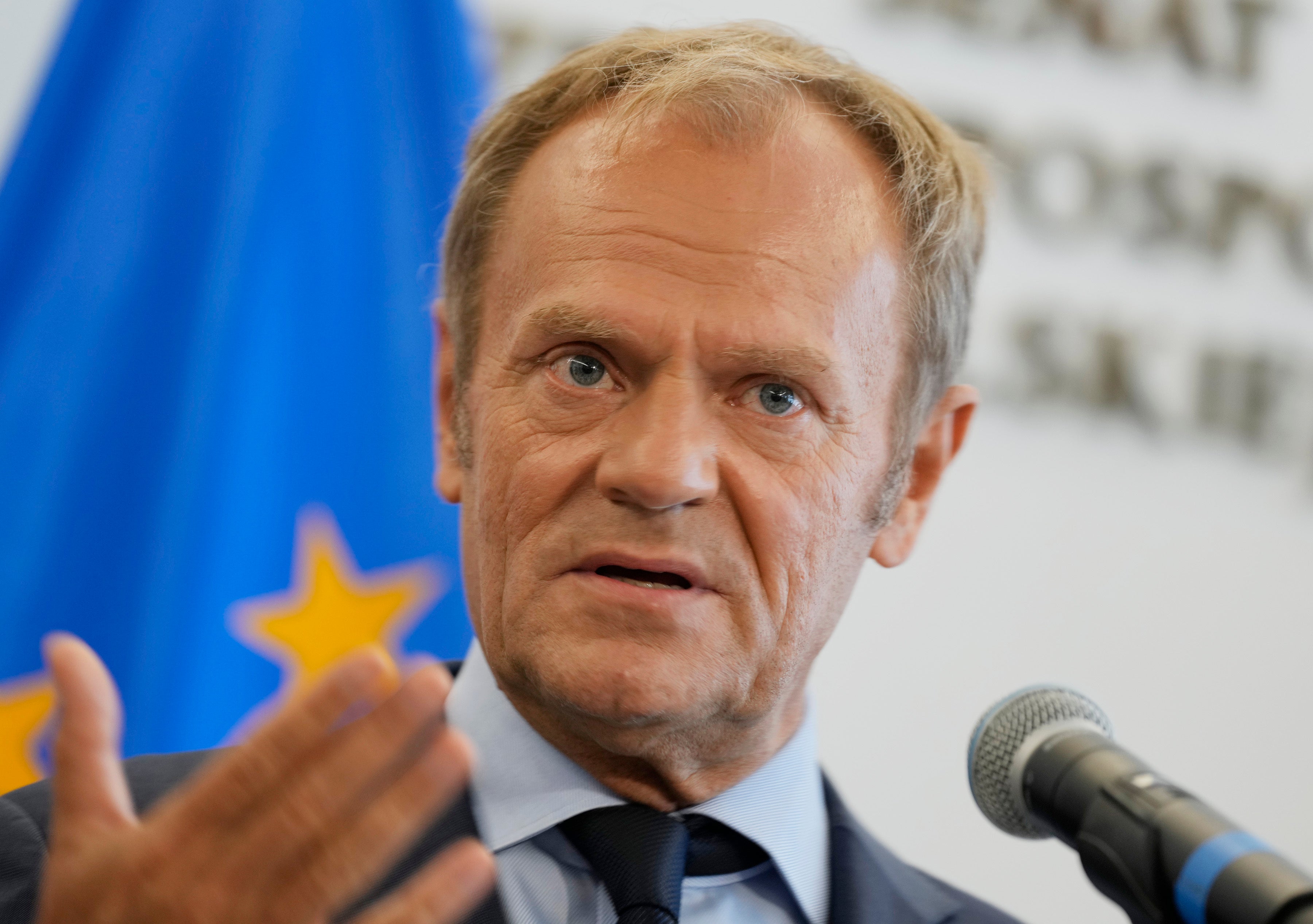After Brussels, Warsaw: Donald Tusk looks to wrest Poland back from its rightward shift in bid for leadership
The former Prime Minister may struggle to attract support among moderate conservative Poles who are skeptical about his links to the EU, William Nattrass reports from Warsaw

A seismic tremor shook Polish politics last week, with the news that Donald Tusk, former prime minister and ex-European Council president, is returning to fight Poland’s national-conservative leadership as the head of the country’s largest opposition party.
Upon his recent election as the leader of Civic Platform, the party he co-founded two decades ago, Mr Tusk said he has chosen to re-enter the fray of Polish politics to counter the “evil” of the country’s ruling Law and Justice (PiS) party, which has been in power since 2015.
“Today, evil reigns in Poland and we want to fight it,” Tusk said to his supporters at a comeback appearance in Warsaw.
With PiS’s regressive social policies putting Poland increasingly at loggerheads with Brussels, few figures could be more archly pro-EU than Tusk. Indeed, his motto of “unity” throughout six years as European Council president represents an instinct towards integration which is anathema to the country’s current leadership.
PiS has recently raised the stakes in its defiance of EU authority and values. A near-total ban on abortion and the creation of "LGBT-free zones" led to outcry throughout the bloc, while prime minister Mateusz Morawiecki has asked the country’s Constitutional Tribunal to rule on whether EU law should have primacy over Polish law, openly questioning the legitimacy of the current legal relationship between Poland and Brussels.

The EU pushed back strongly on both counts, leading Polish government figures to accuse Brussels of taking a “colonialist” attitude towards member states.
Mr Tusk, in contrast, represents an optimistic vision of Polish alignment with the EU. And in the days following his return, polls showed a boost for Civic Platform, suggesting the former prime minister may be the man to finally oust the current government.
His return also led to unprecedented levels of online and social media interest, with searches for the politician almost matching those for star striker Robert Lewandowski during Euro 2020.
Yet amid the fanfare, Polish analysts warn the current political climate may make it difficult for Tusk to tackle PiS’s particular brand of social conservatism.
“Polish society is generally quite pro-EU, and political divisions here are not usually related to perceptions of the EU in and of itself,” Renata Mieńkowska, a political scientist from the University of Warsaw, told The Independent.
“The government’s criticism of EU interference is usually related to some wider social issue or question of values. And the opposition finds it very difficult to tackle the government on questions such as abortion and LGBT+ rights, because these topics are still highly sensitive in conservative Polish society,” she added.
Tusk therefore faces a significant challenge in teasing out the tangle of ideological controversies fostered by PiS when presenting his vision for closer alignment with the EU.
To this end, the EU’s unequivocal stance on issues such as LGBT+ rights and abortion may in fact prove a hindrance rather than a help. Even Poles who are outraged by the government’s illiberal policies often take a more conservative stance than is advocated by Brussels on such matters.
“When Polish women protested against the abortion ban, many of them were not demanding complete freedom – a lot of them were simply demanding the status quo,” says Mieńkowska.
Tusk may be a paragon of EU values, but it is by no means certain that those values are appealing to Poles unhappy with the current leadership.
In order to gain the support needed to dethrone PiS, a different kind of vision will therefore be needed – one most likely centred around the economy and prosperity for the country’s major cities.
And as PiS presses ahead with its legal and cultural challenges to EU authority, Tusk may also use his pro-EU persona to mobilise fears about the economic effects of a potential “Polexit”.
He has already criticised PiS for fostering Poland’s “complete isolation”, saying “Putin’s Russia is closer to their hearts than the European Union”, and lashing out the party’s recent signing of an “ideological declaration” critical of Brussels from right-wing parties across Europe.
When Polish women protested against the abortion ban, many of them were not demanding complete freedom – a lot of them were simply demanding the status quo
Yet while Tusk may be a powerful voice speaking out against the current government, analysts also question the general appeal of his personality for Polish voters.
“Polish politics has become highly personality-driven,” Tomasz Pawłuszko, from Poland’s Sobieski Institute, told The Independent.
“Tusk is a good public speaker and can draw media attention. But supporters of the government see him as a ‘pro-German traitor’, while supporters of other opposition parties characterise him as ‘too old’”.
Indeed, Tusk is nothing if not an establishment figure. His appeal to young voters is limited, while he faces lingering anger among some Poles over unpopular policies during his previous term as Polish prime minister.
Prior to the announcement of his return, a poll suggested that 60 per cent of Poles did not want him to re-enter Polish politics, with only nine per cent saying they were definitely in favour of the comeback.
Tusk may be portrayed as a white knight for Polish politics by members of his own party, but his broader appeal remains uncertain. Representing an EU whose values still sit uncomfortably with many moderate Polish conservatives, the former prime minister will have to do more than criticise the current government to win back control from the forces of social conservatism.
Join our commenting forum
Join thought-provoking conversations, follow other Independent readers and see their replies
Comments